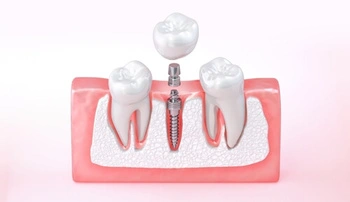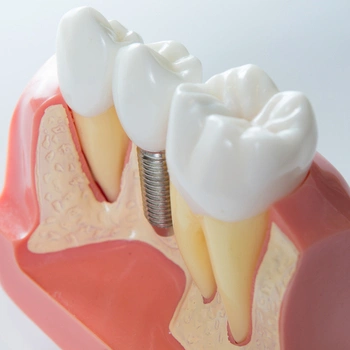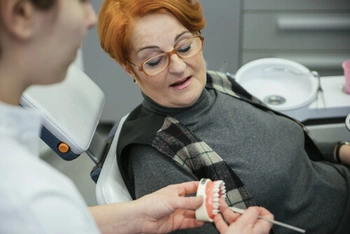Losing a dental implant can feel alarming, especially after investing time and effort into the implant procedure. While it’s rare for an entire implant to come loose or fall out, it can happen due to several underlying issues. Knowing what to do when a dental implant fell out, and understanding how to prevent it, can help you protect your oral health and avoid further damage.
This guide explains what it means when a dental implant falls out, what might have caused it, and the next steps to take to restore your smile safely.
When a Dental Implant Fell Out: What It Means
If your dental implant fell out, it’s important to determine which part has actually come loose. Not every case means total implant failure.

- Just the crown: The visible artificial tooth (the implant crown) may detach, while the metal post remains secure in the jawbone.
- The abutment or screw: The implant abutment or abutment screw might have loosened or broken.
- The entire implant: In rare occasions, the entire implant (the titanium post fused with bone) may come out, which suggests severe bone loss or infection around the implant.
If you’re unsure which part came loose, keep it safe and stay calm; your dentist can assess it during your appointment.
Why Does a Dental Implant Fall Out?
A dental implant is designed to be a long-lasting solution for a missing tooth. When an implant falls out, it’s usually the result of one or more factors, including:
1. Poor Bone Support
If the surrounding bone fails to integrate with the implant post, it won’t have enough bone support to stay stable. This can happen if there wasn’t enough bone density during the dental implant surgery or if bone grafting wasn’t successful.
2. Gum Disease or Infection
Having gum disease or a bacterial infection around the implant can cause inflammation and gradual loss of the gum tissue and bone that anchor the implant. This infection is a common cause of dental implant failure.
3. Excessive Force or Pressure
Applying excessive pressure or excessive force, such as teeth grinding or chewing very hard foods, can damage the implant’s stability or loosen the dental implant screw.
4. Poor Oral Hygiene
Neglecting proper oral hygiene or failing to maintain good oral hygiene can allow bacteria to accumulate around the implant, leading to infection and bone damage.
5. Medical Conditions
Certain medical conditions, such as diabetes or autoimmune disorders, can slow healing and affect the implant’s ability to bond with the jawbone.
6. Complications from Surgery
In rare situations, implant failure occurs early due to issues during the implant procedure itself, such as incorrect placement, instability, or complications with the healing cap or cover screw.
What to Do Immediately When an Implant Fell Out
When you notice that your implant screw has fallen or your dental implant has fallen, here’s what you should do:
- Stay calm and avoid panic.
It’s not uncommon for smaller components, such as an abutment screw or healing abutment, to loosen. - Keep the part safe.
If the implant part or crown has come out, place it in a clean container and bring it to your dentist. - Rinse gently with warm salt water.
This can help rinse the area and lower the risk of infection until you can see your dentist. - Avoid chewing on that side.
Eat soft foods only and avoid chewing close to the affected area to stop any further damage. - Book a dental appointment or teledental consultation.
If you can’t reach your dentist right away, a teledental consultation can help you determine whether the issue is a dental emergency requiring immediate care.
What Your Dentist Will Do

Depending on the findings, treatment options may include:
1. Reattaching or Replacing the Crown
If only the crown has fallen off, your dentist may clean it and reattach it using dental cement or a new implant screw.
2. Tightening or Replacing the Abutment
A loose implant may be caused by a faulty dental abutment or abutment screw. Your dentist can replace or tighten the parts to stabilise the restoration.
3. Managing Infection or Gum Problems
If there is an infection around the implant, your dentist may prescribe an antibiotic rinse and perform a deep clean to remove bacteria and promote healing.
4. Addressing Bone Loss or Implant Failure
In cases of implant failure, bone grafting or other surgical treatments may be needed to rebuild the jawbone before placing a new implant.
Recognising Early Signs of a Loose Dental Implant
Catching issues early often prevents complete dental implant failure.
Here are common early signs that your implant might be loosening:
- The implant starts to move slightly when you touch it
- Redness or bleeding around the implant
- Persistent pain or swelling near the site
- Unusual taste or odour in your mouth
- Gum recession exposing the implant part
If you experience any of these signs, contact your dentist as soon as possible for a check-up.
How to Prevent Your Dental Implant from Falling Out
Most implants last for many years with proper care and consistent dental care. To reduce the risk of problems, follow these key prevention tips:
1. Maintain Good Oral Hygiene
Practise good oral hygiene by brushing and flossing every day while paying close attention to the area around the implant. Regular cleaning helps prevent bacterial infection and protects the gum tissue and bone underneath.
2. Attend Regular Dental Check-ups
By attending regular dental visits, your dentist can check how your implant is doing and detect potential complications early.
3. Avoid Excessive Force
Don’t use your teeth to open packages or chew hard objects. Wearing a nightguard can help you protect your implant if you tend to grind your teeth while sleeping.
4. Follow Post-Surgery Instructions
After dental implant surgery, follow your dentist’s guidance about eating soft foods, using an antibiotic rinse, and avoiding physical strain to support the healing process.
5. Treat Underlying Gum Disease Early
If you notice sore or bleeding gums, seek treatment immediately. Healthy gums play an important role in ensuring the long-term success of implants.
6. Manage Medical Conditions
Keep chronic medical conditions like diabetes well-controlled to maintain healthy blood flow and bone healing.
Understanding Implant Recovery and Risks
Although the implant procedure is considered a safe and effective treatment in cosmetic dentistry, it’s still a difficult procedure that requires precision and careful aftercare.
A systematic review of dental studies confirms that the outcome often relies on key factors like the level of bone support, surgical technique, and patient compliance with aftercare instructions.
The healing period may range from several weeks to a few months, based on how well your bone integrates with the implant. During this period, it’s essential to protect the site and maintain proper oral hygiene to avoid infection or implant failure.
 When to Treat It as a Dental Emergency
When to Treat It as a Dental Emergency
If the entire implant comes out, or if you experience severe pain, heavy bleeding, or visible bone exposure, contact your dentist immediately. This qualifies as a dental emergency.
Delaying treatment may result in infection or loss of additional bone support in the jawbone.
The Bottom Line
When a dental implant fell out, it’s not always a complete disaster. Sometimes, it’s only just the crown or a loose implant component that can be fixed quickly. However, if it’s the entire implant, early professional attention is critical to prevent further damage.
Keep calm, protect the implant piece, and seek advice from your dentist right away. With consistent care and by maintaining good oral hygiene, your replacement implant can have a strong chance of long-term success.
If you’re concerned about a dental implant that feels loose or has fallen out, or if you want to learn how to protect your implant for the long term, book a consultation with us at our dental clinic in Epping or call 03 9626 9581. Our friendly team can assess your situation and guide you through the best next steps for restoring your smile and oral health.
Note: Any surgical or invasive procedure carries risks. Before proceeding, you should seek a second opinion from an appropriately qualified health practitioner.
Resources
Cherney, K. & McLean, A. (2025). ‘10 Ways to Keep Your Teeth Healthy’. Healthline, 13 May. San Francisco, CA: Healthline Media.
https://www.healthline.com/health/dental-and-oral-health/best-practices-for-healthy-teeth
Watson, S. (2024). ‘Gingivitis and Periodontal Disease (Gum Disease)’. WebMD, 9 February. New York, NY: WebMD LLC.
https://www.webmd.com/oral-health/gingivitis-periodontal-disease
Mayo Clinic Staff. (2024). ‘Dental Implant Surgery’. Mayo Clinic, 23 October. Rochester, MN: Mayo Foundation for Medical Education and Research.
https://www.mayoclinic.org/tests-procedures/dental-implant-surgery/about/pac-20384622
Note: Any surgical or invasive procedure carries risks. Before proceeding, you should seek a second opinion from an appropriately qualified health practitioner.


 When to Treat It as a Dental Emergency
When to Treat It as a Dental Emergency






